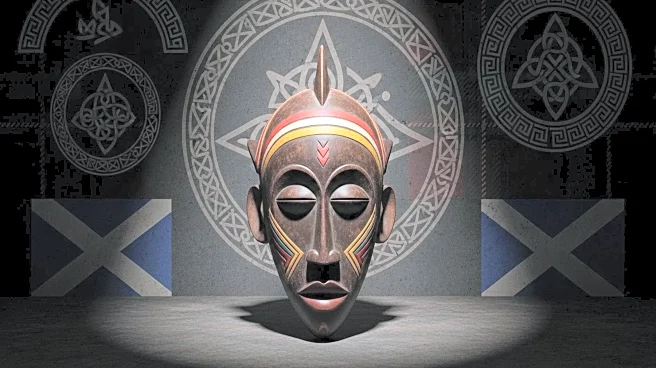What's Happening?
Two individuals have been arrested on suspicion of immigration offences after a group calling itself the 'Kingdom of Kubala' was evicted from a forest near Jedburgh, close to the England-Scotland border. The group, which had been camping in woodland since May, claims to represent a self-declared African tribe reclaiming land allegedly taken from their ancestors 400 years ago. The trio includes Ghanaian national Kofi Offeh, who styles himself as 'King Atehene'; his wife Jean Gasho, a US citizen who goes by 'Queen Nandi'; and 21-year-old Kaura Taylor, referred to as 'handmaiden Asnat'. Initially camping on private property, they were served an eviction notice in August and later moved to a neighbouring plot owned by the Scottish Borders Council, prompting legal action. On Wednesday, Selkirk Sheriff Court ruled that the group could not return to the original land. The following day, officers from Immigration Enforcement and Police Scotland visited the site, where two members of the group were taken into custody.
Why It's Important?
The arrest of the self-proclaimed African 'tribe' highlights ongoing issues related to immigration enforcement and land rights. The group's actions have raised questions about the legitimacy of self-declared sovereignty and the legal implications of occupying land without permission. This incident underscores the challenges faced by authorities in managing unauthorized settlements and enforcing immigration laws. The situation also reflects broader societal debates about cultural identity, historical land claims, and the legal frameworks governing such assertions. The arrests may serve as a precedent for similar cases, influencing how authorities handle future claims of self-declared sovereignty and land occupation.
What's Next?
The ongoing investigation by the Home Office and local authorities will likely determine the legal consequences for the individuals involved. The case may prompt further scrutiny of immigration policies and enforcement practices in the region. Local authorities, including the Scottish Borders Council, may review their engagement strategies with groups claiming land rights based on historical assertions. The incident could also lead to increased public discourse on the balance between cultural identity claims and legal land ownership. Stakeholders such as legal experts, cultural historians, and immigration advocates may weigh in on the implications of this case, potentially influencing policy discussions and legal interpretations.
Beyond the Headlines
The case of the 'Kingdom of Kubala' raises deeper questions about the intersection of cultural identity and legal frameworks. It challenges the notion of self-declared sovereignty and the legitimacy of historical land claims in modern legal contexts. The group's actions and subsequent legal challenges may spark discussions on the ethical dimensions of land reclamation based on ancestral ties. Additionally, the incident highlights the role of media in shaping public perception of unconventional claims to land and identity. The broader cultural implications may influence future narratives around indigenous rights and historical justice.









